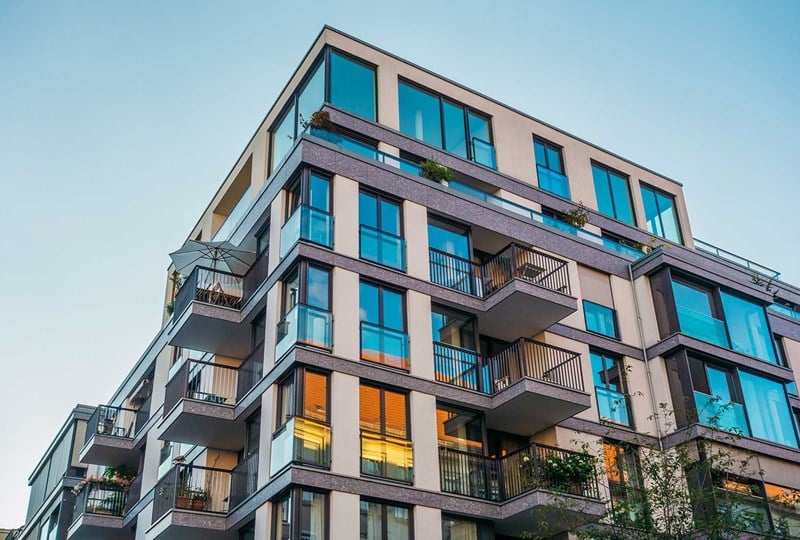What’s a Condominium? Different Types of Condos Explained

So what is a condo? You might be thinking of apartments which is quite close, but not exactly. Condos or condominiums are individual units in a building. Respective homeowners own each unit. You’re responsible for what’s happening inside your home (including repairs and maintenance), but you’ll pay monthly fees for shared areas.
Owning a condo comes with a few perks. You can enjoy shared amenities (such as a swimming pool, gym, parks, and entertainment facilities). You also belong to a community, and a condo association is responsible for the upkeep and maintenance of common areas. You might enjoy annual festivals and events suitable for your community. Condos are preferred by homeowners who want to minimize the hassles associated with homeownership.
You will pay for property repairs, but finding contractors is easy because many homeowners live in your building. Your condo association can provide links to reputable handy persons in the area, making your job easier. You can also rent a condo from the homeowner. The condo association is not involved in the decision. However, you must follow the set rules & regulations.
What is a Condo?
Condos are high-rise buildings used to house several families. The four walls don’t just define the ownership of a condominium. You’re sharing those walls with other homeowners. So the term “air space” describes your ownership and control area.
A condo is not just residential property. The same concept is applied to commercial properties, i.e., office condominiums. That’s especially true in dense tech areas where several startups work in the same building.
Housing Market Impact on Condos
Historically, condos are more affordable than single-family homes, but the prices are rising. Shortage of housing inventory drives condo prices along with other home types. Condos provide less housing space and more living areas. (In a single-family home, you won’t be living in the garage or lawn, but you will pay tax on that area too). That’s why condos are cheaper, considering the taxes.
The housing market favors condos because they offer a new lifestyle. For example, you can take an extended vacation without worrying about lawn or snow.
Why Buy a Condo?
Condos are great for prospective homeowners looking to buy their first place. A condo will give you a sense of ownership without the additional maintenance burden. Condos are also great for those who want investment property.
Most people prefer condos because they don’t want to pay a high price. Modular homes can be an alternative in this case, as they are more affordable than single-family homes. A modular home can get you a bigger place at a lower price. Check your options with a realtor before choosing a home type.
Pros of Buying a Condo
Investing in condominiums has several advantages:
- Low-maintenance hassle: Don’t like moving your lawn? Have to hire someone for snow removal? Don’t enjoy changing light fixtures in the house? Don’t want to pay a hefty bill for roof repair? Welcome to the condo lifestyle. You can avoid all these hassles. Own your home without expensive maintenance. Your condo management will do the heavy lifting. You can enjoy shared amenities without worrying about their management.
- Enhanced Security: Many condos have a central security system. A shared gate with a security person checking for the entrance of people. There are security cameras and strategies designed to protect the complex. The same type of security isn’t possible in a single-family home. That security is an excellent attraction for single people and frequent travelers. You can leave your house behind without worrying about theft.
- Socializing: Condos are great for those who want to socialize. Want to attend monthly parties? Meet people at the pool or arrange meetings in the business center. Barbeque sites and festivals are also common in condos.
- Affordability: An affordable option to start your journey as a homeowner.
- Amenities: Clubhouse, parking, business center, party hall…every condo building has different amenities for the residents.
Cons of Buying a Condo
- Strict HOA Rules: Living in a condo is as good as the HOA association. Strict rules are the #1 reason people don’t recommend living in a condo. For example, your association might restrict the number of people, pets, guests, items to store, smoking, trash pickup, etc.
- Investment value depends on other houses: Real estate is all about comparable properties. A few loud neighbors can disturb the lifestyle of many in a condo building. If individual condos are not well maintained (or if foreclosed), that lowers the price for all other condos.
- High-mortgage rates: Mortgage rates for condos are generally higher than single-family homes.
- Lack of privacy: You’re sharing walls and space with other residents. Hearing your neighbors can be routine.
- Lack of greenery: While shared amenities are great—condo living isn’t about a natural lifestyle. Green space is not generously available, making it tough on your body.
- Restrictions on Airbnb rentals: You can buy a condo for investment purposes, but you must review the rules & regulations. Most HOA associations won’t allow using the property as Airbnb rentals, and your tenants need to follow the rules of society.
Comparing condominiums with other housing types
Condo vs. Apartment
At first glance, condos and apartments look the same—similar construction style, with multiple units on the same floor with an HOA managing the property. The difference lies in the ownership but is also shared in some states. Generally speaking, condos are owned, and apartments are rented. However, in New York, you can buy an apartment, and it’s possible to rent a condo.
Condo vs. Townhome
Townhouses (or townhomes) are located close together and share walls. But that doesn’t make them a condo. The construction style is vastly different. Townhomes can have two floors (in a single unit), often bigger than condos. There is an HOA association, but limited amenities are available. Amenities are also not located in the same building. You might also have a private garage or yard, so owning a townhome is not entirely maintenance-free.
Condo vs. House
What’s the difference between a condo and a single-family home? Aside from noticeable construction differences, we have one more:
- You have complete control in a single-family home. You can renovate or construct your home according to your liking. The same is not valid for condos. For example, you cannot use a different design for the mailbox or change the exterior of your home. With control comes responsibility. If your home needs repairs, it’s your responsibility. But in a condo, those costs are shared by other homeowners.
Types of Condos
There are different types of condos in the market.
- Large complexes comprising 100s of units with high-rise elevators
- Small walk-up buildings
- Old and new constructions
The vibe and environment of condo complexes are different. Before buying, try renting for a few months to get a feel for the lifestyle.
Private Condo or Private Own Apartment
The respective landlord owns a private condo. So that will be a rented unit. So let’s say you buy a condo and then rent it out: that’s the definition for private condos or privately owned apartments.
Condo House
A condo house is like a traditional condo with all the features standard in a condo building.
Condo Share
Living in a condo becomes more interesting. You can buy condos. You can rent a condo. What’s more? You can also use the same property for vacation and share it with others. So a condo share or timeshare is a condominium used as a second/vacation home. Tenants can come and go according to the schedule. You have the option to rent the condo for a specific time. Bookings are made earlier. Condo shares are not investment properties; the owner must pay maintenance and taxes. Perks include additional income for the landlord and an inexpensive experience for tenants (compared to resorts and hotels).
Detached Condo
A detached condo is a freestanding unit with boundaries. As the name suggests, it’s not attached to other units. Some areas near cities have clustered units (located nearby) referred to as detached condos. An HOA manages the shared spaces. Detached condos are less expensive than single-family homes because you share the amenities. Outside the cities, forming a community for mutual benefits and access to amenities makes sense.
Condo Building
The condo building is a complex where several condos are housed. It’s a way to provide affordable yet modern housing opportunities to several families. Condo buildings also house amenities for their members.
The Bottom Line: What is a Condo?
- So what is a condo? Is it better than a single-family home? What is the impact if you want to sell your home? A condominium is a large-scale building you see in the city heart built for residential purposes. There are also office condos, but mostly the term is reserved for residential properties. In that building, there are several (sometimes 100s) individual homes, with each homeowner entitled to the title of their unit. Condo owners enjoy a sense of security and belonging to the community. They enjoy mutual facilities like a clubhouse, private parking, gym, salons, and other necessities of life. Because so many homeowners live in one place, condominiums are also attractive for commercial activities. Modern condominiums provide access to closeby facilities like hospitals, shopping malls, etc. Depending on the amenities, your area's condo prices will be high or low.
- So should I buy or rent a condo? That’s a question frequently asked by our readers. Well! Like purchasing any house, you need to prepare for closing costs, commissions, and the down payment. So buying is a good idea if you can afford the downpayment and closing costs and you’re planning to occupy the unit for 5-7 years. But living for 2-3 years won’t cover your initial investment in the house.
- Condos are great for your first investment venture. Because of security restrictions and regulations, tenants can’t do everything. They will have to abide by the law—making your investment secure. Condo values tend to go up in a healthy market. In dense areas, condos are always in demand, and finding tenants is easier. Talk to a real estate agent to get an estimate for current and future prices.
